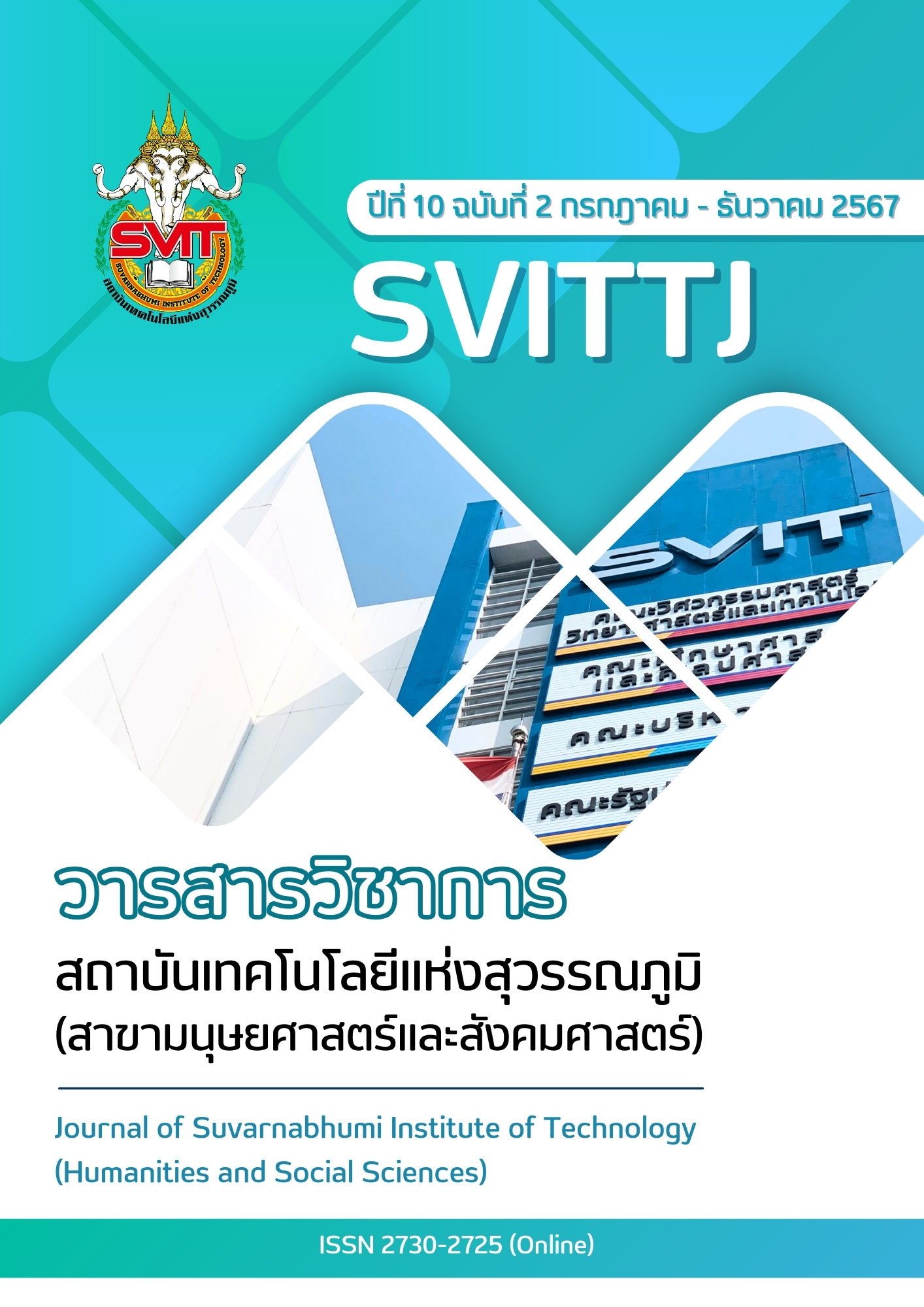PHENOMENON-BASED LEARNING: EDUCATIONAL INNOVATION IN LEARNING PHENOMENA
Keywords:
Educational Innovation, Learning, Phenomenon-Based LearningAbstract
This article presents the concept of Phenomenon-Based Learning, an instruction in response to learning management of the essential work skills of the 21st century Finnish education. The teaching approach is based on the phenomena of the world to develop interpersonal and communication skills, agile thinking skills, creative thinking skills, and self-directed learning skills in different topics of learners’ view. This is called integrated learning and is done by combining transdisciplinary knowledge and subjects and guidelines for developing lifelong learning skills: 1) stimulate interest 2) show challenging situation 3) discuss and reflect 4) construct knowledge and 5) collaborate learning via the internet and information system in the digital era. The 5 steps of learning management: 1) Enquiry Question, 2) Mini-lessons and Scaffolding, 3) Research and Collaborative work, 4) Public Presentation, and 5) Reflection on Learning are for educational instructors to use and apply in a holistic manner to learning management.
References
กิร์สติ โลนกา. (2563). Phenomenal learning: นวัตกรรมการเรียนรู้แห่งอนาคตแบบฟินแลนด์. แปลจากPhenomenal learning from Finland. (แปลโดย สุนันทา วรรณสิทธิ์ เบล และ พยุงศักดิ์ แก่นจันทร์). กรุงเทพมหานคร: บุ๊คสเคป.
ทิศนา แขมมณี. (2562). ศาสตร์การสอน องค์ความรู้เพื่อการจัดกระบวนการเรียนรู้ที่มีประสิทธิภาพ. กรุงเทพฯ: สำนักพิมพ์แห่งจุฬาลงกรณ์มหาวิทยาลัย.
มาเรียม นิลพันธุ์. (2558). วิธีวิจัยทางการศึกษา. นครปฐม: ศูนย์วิจัยและพัฒนาการทางการศึกษา คณะศึกษาศาสตร์ มหาวิทยาลัยศิลปากร.
ราชบัณฑิตยสถาน. (2546). พจนานุกรมฉบับบัณฑิตยสถาน. พ.ศ. 2542. กรุงเทพฯ: นามมีบุ๊คส์พลับลิเคชั่น.
วัชราภรณ์ ประภาสะโนบล. (2564). รูปแบบการพัฒนาสมรรถนะการจัดการเรียนรู้ของนักศึกษาครูโดยใช้โครงงานเป็นฐานร่วมกับการสอนแบบสร้างสรรค์เพื่อเสริมสร้างความสามารถในการสร้างสรรค์นวัตกรรมของนักเรียน. วิทยานิพนธ์ปรัชญาดุษฎีบัณฑิต สาขาหลักสูตรและการสอน (กลุ่มหลักสูตรและการนิเทศ) มหาวิทยาลัยศิลปากร: นครปฐม.
สุรางค์ โค้วตระกูล. (2553). จิตวิทยาการศึกษา.พิมพ์ครั้งที่ 9. กรุงเทพฯ : สำนักพิมพ์แห่งจุฬาลงกรณ์ มหาวิทยาลัย.
สำนักงานนวัตกรรมแห่งชาติ. (2558). สุดยอดนวัตกรรมไทย. กรุงเทพฯ: สำนักงานนวัตกรรมแห่งชาติ กระทรวงวิทยาศาสตร์และเทคโนโลยี.
สำนักพัฒนาการฝึกหัดครู สำนักงานสภาสถาบันราชภัฏ. (2544). คู่มือการฝึกอบรมการวิจัยในชั้นเรียน. กรุงเทพฯ: เสมาธรรม.
อดิศร ศิริ และคณะ (2565). ผลการจัดการเรียนรู้ตามแนวคิดปรากฏการณ์เป็นฐานร่วมกับสื่อประสมเพื่อส่งเสริมความคิดวิเคราะห์ ของนักศึกษาระดับปริญญาตรี มหาวิทยาลัยสงขลานครินทร์ วิทยาเขตปัตตานี.วารสารพุทธจิตวิทยา.7(2),128-141.
อรพรรณ บุตรกตัญญู. (2561). การเรียนรู้โดยใช้ปรากฎการณ์เป็นฐานเพื่อการสร้างมุมมองแบบองค์รวมและการเข้าถึงโลกแห่งความจริงของผู้เรียน. วารสารครุศาสตร์ จุฬาลงกรณ์มหาวิทยาลัย 46(2), 348-365.
Fields, D. (2019, March). Applying Phenomenon-Based Learning to Day-to-day Lessons. Paperpresented at the 2019 Oxford National Conference, Italy. Retrieved 2021, July 15. from https://elt.oup.com/feature/it/ONC19/?cc=de&selLanguage=de& mode=hub
Finnish National Board of Education. (2016). National Core Curriculum for Basic Education 2014. Helsinki, Finland: Finnish National Board of Education.
Halinen, I. (2018). The New Educational Curriculum in Finland. In M. Matthes, L. Pulkkinen, C. Clouder, & B. Heys (Eds). Improving the Quality of Childhood in Europe. 7(pp. 75–89). Brussels, Belgium: Alliance Childhood European Network Foundation.
Mattila P. and Silander P. (2015). How to create the school of the future: revolutionary thinking and design from Finland. Finland: Multprint, Oulu.
Silander, P. (2015). Phenomenon based learning. Retrieved 2021, July 15. from http://www.phenomenaleducation.info/phenomenon-based-learning.html
Tissington, S. (2019). Learning with and through phenomena: An explainer on phenomenon-based learning (Paper presented at the Association of Learning Developers in HigherEducation Northern Symposium). Middlesbrough UK.
Downloads
Published
Issue
Section
License
Copyright (c) 2024 Suvarnabhumi Institute of Technology

This work is licensed under a Creative Commons Attribution-NonCommercial-NoDerivatives 4.0 International License.
บทความที่ได้รับการตีพิมพ์เป็นลิขสิทธิ์ของวารสาร Sarasas Journal of Humanities and Social Science ข้อความที่ปรากฏในบทความแต่ละเรื่องในวารสารวิชาการเล่มนี้เป็นความคิดเห็นส่วนตัวของผู้เขียนแต่ละท่านไม่เกี่ยวข้องกับสถาบันสารสาสน์เทคโนโลยีแห่งสุวรรณภูมิแต่อย่างใด ความรับผิดชอบองค์ประกอบทั้งหมดของบทความแต่ละเรื่องเป็นของผู้เขียนแต่ละท่าน หากมีความผิดพลาดใดๆ ผู้เขียนแต่ละท่านจะรับผิดชอบบทความของตนเองแต่ผู้เดียว



